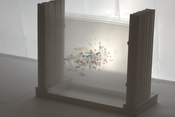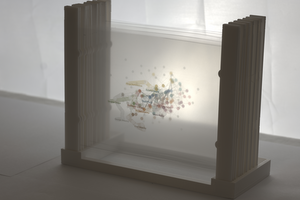Information
- Publication Type: Conference Paper
- Workgroup(s)/Project(s):
- Date: 2025
- ISBN: 978-989-758-728-3
- Location: Porto
- Lecturer: Daniel Pahr

- Event: 20th International Joint Conference on Computer Vision, Imaging and Computer Graphics Theory and Applications (VISIGRAPP , GRAPP, HUCAPP and IVAPP 2025)
- DOI: 10.5220/0013116000003912
- Booktitle: Proceedings of the 20th International Joint Conference on Computer Vision, Imaging and Computer Graphics Theory and Applications - Volume 1 GRAPP, HUCAPP and IVAPP: IVAPP,
- Pages: 8
- Volume: 1
- Conference date: 26. February 2025
– 28. February 2025
- Pages: 859 – 866
- Keywords: Dynamic Networks, Fabrication, Information Visualization, Physicalization
Abstract
We present HoloGraphs, a novel approach for physically representing, explaining, exploring, and interacting with dynamic networks. HoloGraphs addresses the challenges of visualizing and understanding evolving network structures by providing an engaging method of interacting and exploring dynamic network structures using physicalization techniques. In contrast to traditional digital interfaces, our approach leverages tangible artifacts made from transparent materials to provide an intuitive way for people with low visualization literacy to explore network data. The process involves printing network embeddings on transparent media and assembling them to create a 3D representation of dynamic networks, maintaining spatial perception and allowing the examination of each timeslice individually. Interactivity is envisioned using optional Focus+Context layers and overlays for node trajectories and labels. Focus layers highlight nodes of interest, context layers provide an overview of the network structure, and global overlays show node trajectories over time. In this paper, we outline the design principles and implementation of HoloGraphs and present how elementary digital interactions can be mapped to physical interactions to manipulate the elements of a network and temporal dimension in an engaging matter. We demonstrate the capabilities of our concept in a case study. Using a dynamic network of character interactions from a popular book series, we showcase how it represents and supports understanding complex concepts such as dynamic networks.
Additional Files and Images
Additional images and videos
Additional files
Weblinks
BibTeX
@inproceedings{pahr-2025-holographs,
title = "HoloGraphs: An Interactive Physicalization for Dynamic
Graphs",
author = "Daniel Pahr and Henry Ehlers and Velitchko Filipov",
year = "2025",
abstract = "We present HoloGraphs, a novel approach for physically
representing, explaining, exploring, and interacting with
dynamic networks. HoloGraphs addresses the challenges of
visualizing and understanding evolving network structures by
providing an engaging method of interacting and exploring
dynamic network structures using physicalization techniques.
In contrast to traditional digital interfaces, our approach
leverages tangible artifacts made from transparent materials
to provide an intuitive way for people with low
visualization literacy to explore network data. The process
involves printing network embeddings on transparent media
and assembling them to create a 3D representation of dynamic
networks, maintaining spatial perception and allowing the
examination of each timeslice individually. Interactivity is
envisioned using optional Focus+Context layers and overlays
for node trajectories and labels. Focus layers highlight
nodes of interest, context layers provide an overview of the
network structure, and global overlays show node
trajectories over time. In this paper, we outline the design
principles and implementation of HoloGraphs and present how
elementary digital interactions can be mapped to physical
interactions to manipulate the elements of a network and
temporal dimension in an engaging matter. We demonstrate the
capabilities of our concept in a case study. Using a dynamic
network of character interactions from a popular book
series, we showcase how it represents and supports
understanding complex concepts such as dynamic networks.",
isbn = "978-989-758-728-3",
location = "Porto",
event = "20th International Joint Conference on Computer Vision,
Imaging and Computer Graphics Theory and Applications
(VISIGRAPP , GRAPP, HUCAPP and IVAPP 2025)",
doi = "10.5220/0013116000003912",
booktitle = "Proceedings of the 20th International Joint Conference on
Computer Vision, Imaging and Computer Graphics Theory and
Applications - Volume 1 GRAPP, HUCAPP and IVAPP: IVAPP,",
pages = "8",
volume = "1",
pages = "859--866",
keywords = "Dynamic Networks, Fabrication, Information Visualization,
Physicalization",
URL = "https://www.cg.tuwien.ac.at/research/publications/2025/pahr-2025-holographs/",
}
 teaser:
a 3d visualization of a dynamic network, made from transparent projector slides stacked in parallel
teaser:
a 3d visualization of a dynamic network, made from transparent projector slides stacked in parallel

